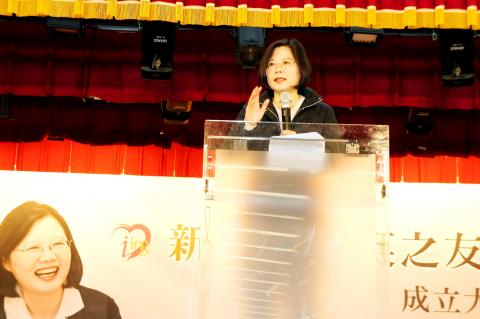The Democratic Progressive Party (DPP) says it is planning to propose an amendment to the Referendum Act (公民投票法) to lower the threshold it sets for passing referendums, 10 days after Premier Jiang Yi-huah (江宜樺) unexpectedly announced plans to put the continuation of construction of the Fourth Nuclear Power Plant to a popular vote.
Over the past week, the party has been unable to present a unified front on the proposal to ask voters if they support suspending construction of the Fourth Nuclear Power Plant in Gongliao District (貢寮), New Taipei City (新北市).
Former Democratic Progressive Party (DPP) chairperson Tsai Ing-wen (蔡英文) yesterday echoed a DPP-wide call for lowering the threshold for national referendums, saying that the passage of a referendum should be decided by simple plurality.

Photo: Lai Hsiao-tong, Taipei Times
The current laws on referendums require a voter turnout of at least 50 percent and a majority of 51 percent for the motion to be aproved, a threshold the DPP said was too high.
In response to the Chinese Nationalist Party’s (KMT) contention that Tsai supported the plant’s construction when she served as vice premier, the former DPP chairperson said the KMT was manipulating past events to fit its own purposes.
Tsai, who served as vice premier between 2006 and 2007, said the then-DPP Cabinet’s approval of the nuclear energy plant’s construction was based on Taiwan Power Co’s (Taipower) pledge to finish construction within the year.
After the approval was given, there were repeated accidents, construction delays, requests for additional budget allocations and the construction was never completed, she said.
At present, the public’s lack of confidence in Taipower and the government, coupled with the accident at the Fukushima Dai-ichi nuclear power plant in Japan two years ago “have completely changed the Taiwanese people’s views on nuclear energy.”
Tsai accused the KMT of handling the issue as a political maneuver, rather than treating it as an energy policy issue that affects people’s lives and public safety.
DPP Chairman Su Tseng-chang (蘇貞昌) is set to attend a DPP legislative caucus meeting today in the Legislative Yuan where the opposition party will try to formulate its final strategy on the matter.
DPP caucus converner Ker Chien-ming (柯建銘) said that the controversy over the Fourth Nuclear Power Plant has created “the most serious social division in recent memory, which is made more complex because it involves political rivalries and energy policy.”
Meanwhile, the DPP is ready to offer whatever support it can in the upcoming anti-nuclear energy demonstrations slated to be held simultaneously in Taipei, Taichung, Kaohsiung and Taitung on Saturday.
However, the DPP pledged to keep a low profile in the protests and would not send politicians to address the crowds. The rallies are being organized by anti-nuclear civic groups and are expected to draw at least 50,000 participants.
The civic groups launched the first “warm-up” demonstration yesterday in Jinshan (金山) District, New Taipei City, which is sandwiched between Shihmen (石門) and Wanli (萬里) districts, where the Jinshan and Guosheng nuclear power plants are located.
Hundreds of demonstrators marched in the street to protest in front of the two nuclear power plants, demanding that all three active plants suspend operations and that construction of the Fourth Nuclear Power Plant be stopped immediately.

Chinese Nationalist Party (KMT) Chairman Eric Chu (朱立倫), spokeswoman Yang Chih-yu (楊智伃) and Legislator Hsieh Lung-chieh (謝龍介) would be summoned by police for questioning for leading an illegal assembly on Thursday evening last week, Minister of the Interior Liu Shyh-fang (劉世芳) said today. The three KMT officials led an assembly outside the Taipei City Prosecutors’ Office, a restricted area where public assembly is not allowed, protesting the questioning of several KMT staff and searches of KMT headquarters and offices in a recall petition forgery case. Chu, Yang and Hsieh are all suspected of contravening the Assembly and Parade Act (集會遊行法) by holding

PRAISE: Japanese visitor Takashi Kubota said the Taiwanese temple architecture images showcased in the AI Art Gallery were the most impressive displays he saw Taiwan does not have an official pavilion at the World Expo in Osaka, Japan, because of its diplomatic predicament, but the government-backed Tech World pavilion is drawing interest with its unique recreations of works by Taiwanese artists. The pavilion features an artificial intelligence (AI)-based art gallery showcasing works of famous Taiwanese artists from the Japanese colonial period using innovative technologies. Among its main simulated displays are Eastern gouache paintings by Chen Chin (陳進), Lin Yu-shan (林玉山) and Kuo Hsueh-hu (郭雪湖), who were the three young Taiwanese painters selected for the East Asian Painting exhibition in 1927. Gouache is a water-based

Taiwan would welcome the return of Honduras as a diplomatic ally if its next president decides to make such a move, Minister of Foreign Affairs Lin Chia-lung (林佳龍) said yesterday. “Of course, we would welcome Honduras if they want to restore diplomatic ties with Taiwan after their elections,” Lin said at a meeting of the legislature’s Foreign Affairs and National Defense Committee, when asked to comment on statements made by two of the three Honduran presidential candidates during the presidential campaign in the Central American country. Taiwan is paying close attention to the region as a whole in the wake of a

OFF-TARGET: More than 30,000 participants were expected to take part in the Games next month, but only 6,550 foreign and 19,400 Taiwanese athletes have registered Taipei city councilors yesterday blasted the organizers of next month’s World Masters Games over sudden timetable and venue changes, which they said have caused thousands of participants to back out of the international sporting event, among other organizational issues. They also cited visa delays and political interference by China as reasons many foreign athletes are requesting refunds for the event, to be held from May 17 to 30. Jointly organized by the Taipei and New Taipei City governments, the games have been rocked by numerous controversies since preparations began in 2020. Taipei City Councilor Lin Yen-feng (林延鳳) said yesterday that new measures by